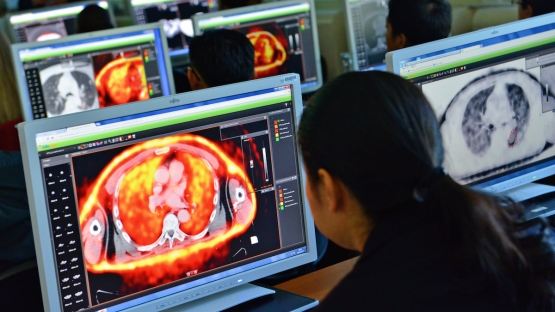An estimated 215 000 additional health professionals will be needed by 2035 to meet the growing demand for radiotherapy services as cancer cases continue to increase. Through collaborating with countries worldwide, the IAEA helps to meet this demand as it works to improve access to quality cancer care for patients, particularly in developing countries.
“As the leading international organization that supports the implementation of radiotherapy around the world, the IAEA is well-positioned to support Member States in meeting this challenge,” said May Abdel-Wahab, Director of the IAEA’s Division of Human Health, at an international event on global health and radiation medicine held in Vienna last week.
Hosted by the Permanent Mission of Japan, the event’s panellists discussed the opportunities and challenges of expanding the reach of radiation medicine to combat the global cancer epidemic in the context of the United Nations’ Sustainable Development Goals. Kenji Shibuya, Professor at the University of Tokyo Graduate School of Medicine, provided an overview of how the global health agenda has evolved and the role of radiation medicine and the IAEA. Other topics included how to increase access to cancer diagnosis and treatment in developing countries, including ways to improve training opportunities for health professionals.
Despite major advances in cancer treatment, technology, and research, one person dies from cancer every four seconds somewhere in the world. Two thirds of cancer-related deaths occur in low and middle income countries, with more than 57% of the world’s total new annual cases occurring in Africa, Asia and Central and South America.
While longer life expectancy and lifestyle changes contribute to the growing number of new cancer cases, access to treatment still remains low in many countries worldwide. The IAEA works with its Member States to improve patient access to trained professionals and affordable healthcare, particularly in less developed regions.
“It is essential to ensure all people obtain the good quality, affordable health services that they need. This includes promotive, preventative treatment and palliative health care services,” said Nelly Enwerem-Bromson, Director of the IAEA’s Programme of Action for Cancer Therapy (PACT), highlighting the need to comprehensively tackle cancer within the context of strengthened health systems.
She emphasized the importance of ensuring sustainable financing for cancer care. “Currently, there is a huge mismatch between countries' needs and their health spending on cancer. The international development assistance to cancer is insufficient, amounting to only 1% of the budget allocated for HIV/AIDS, tuberculosis and malaria.”
A critical component of comprehensive cancer treatment is radiotherapy. Many countries face substantial challenges in expanding access to radiotherapy services, including insufficient budgets for training and education, as well as major infrastructure limitations, such as uncertain energy supply.
“The urgent need to significantly expand radiotherapy services worldwide presents substantial challenges that require innovation in all forms,” said Abdel-Wahab. “Advanced technologies, such as the latest cloud-based radiotherapy platforms, must quickly progress, and new processes are needed to address financial obstacles, develop skills and expand the pool of trained professionals, and improve care efficiency and effectiveness.”
To help overcome these hurdles, the IAEA trains health professionals in radiotherapy and nuclear medicine services, including through innovative and cost effective methods such as distance learning courses online. The IAEA also works with countries to help them adopt existing technologies and tailor techniques to meet specific needs.




